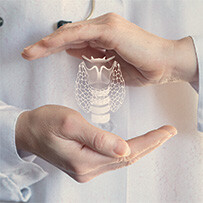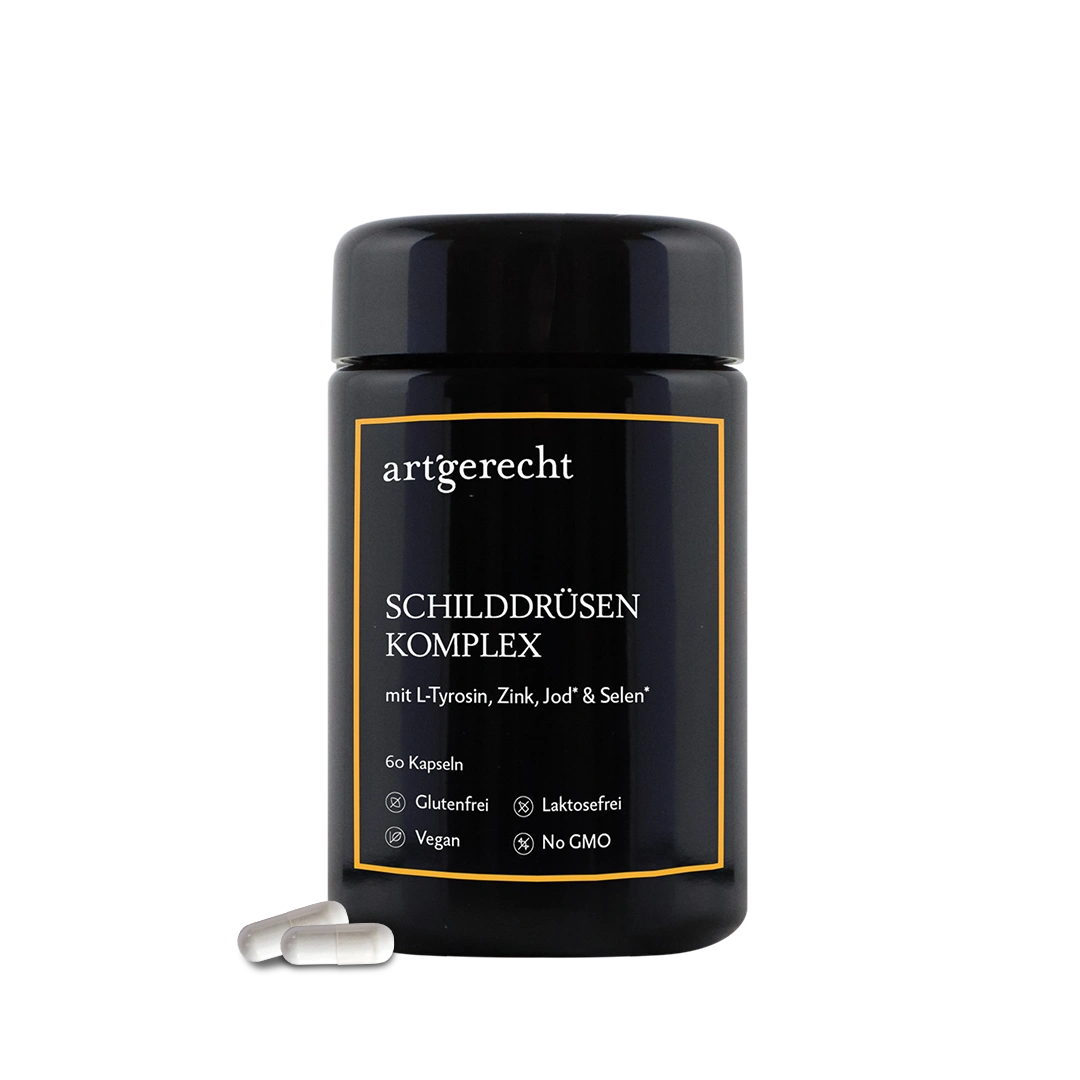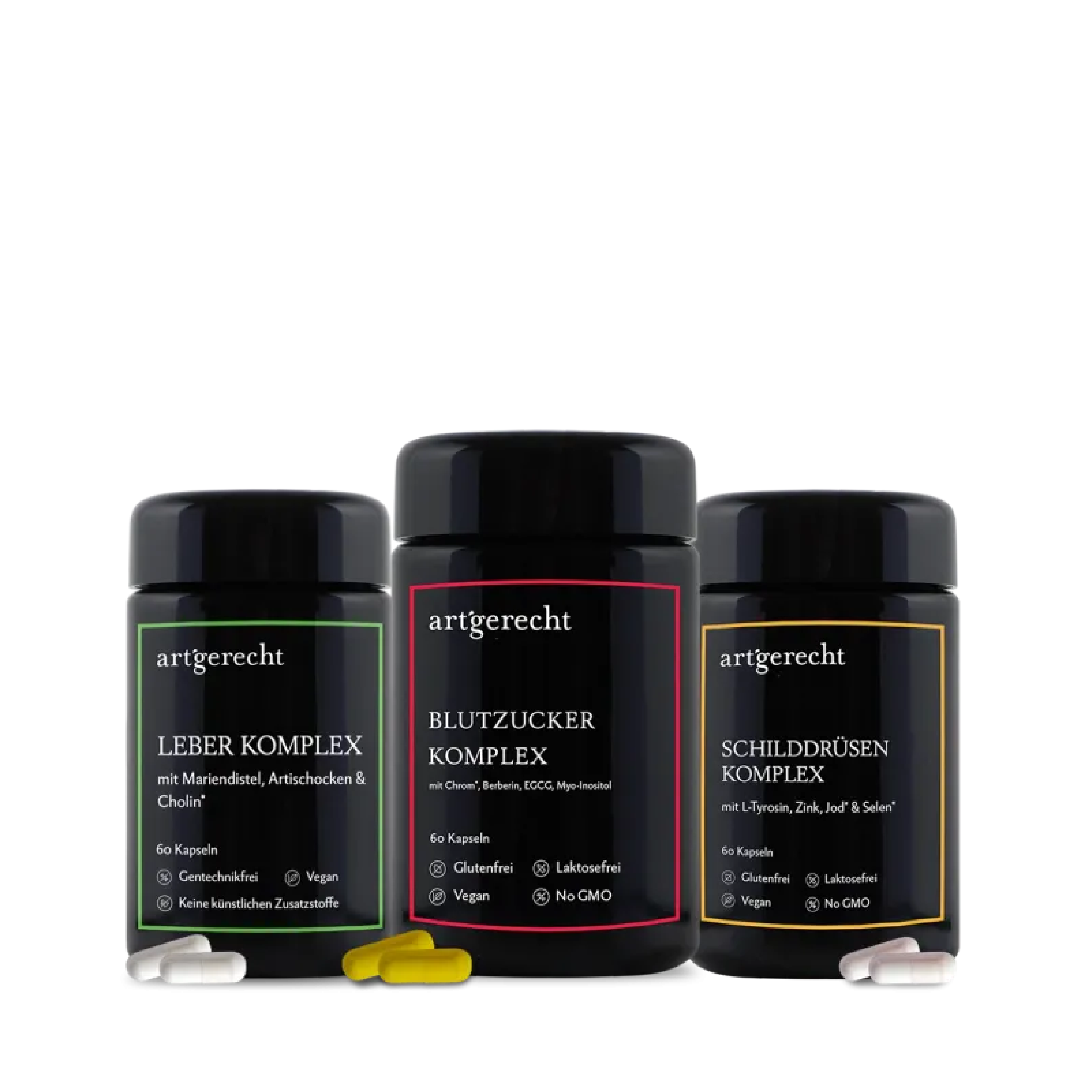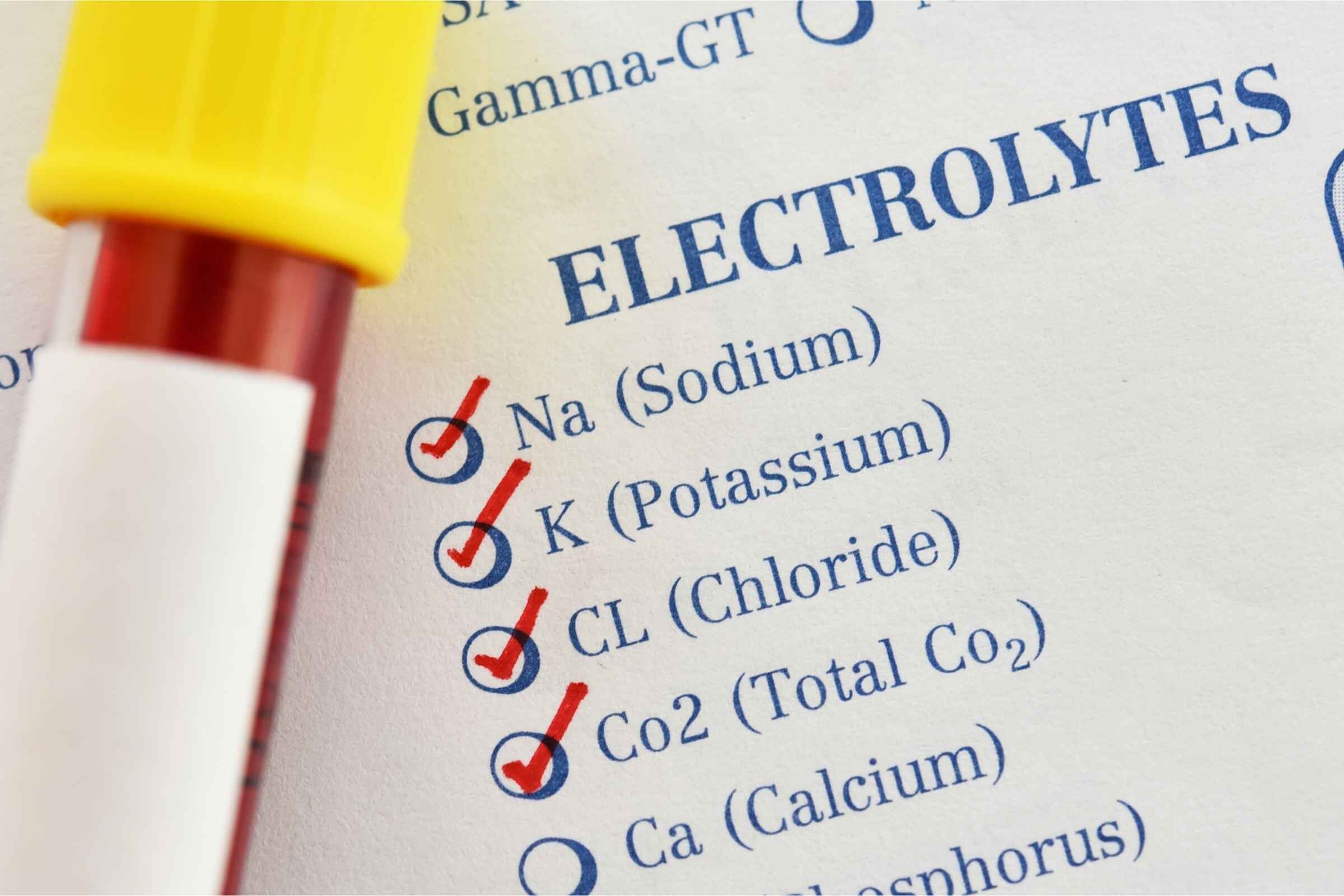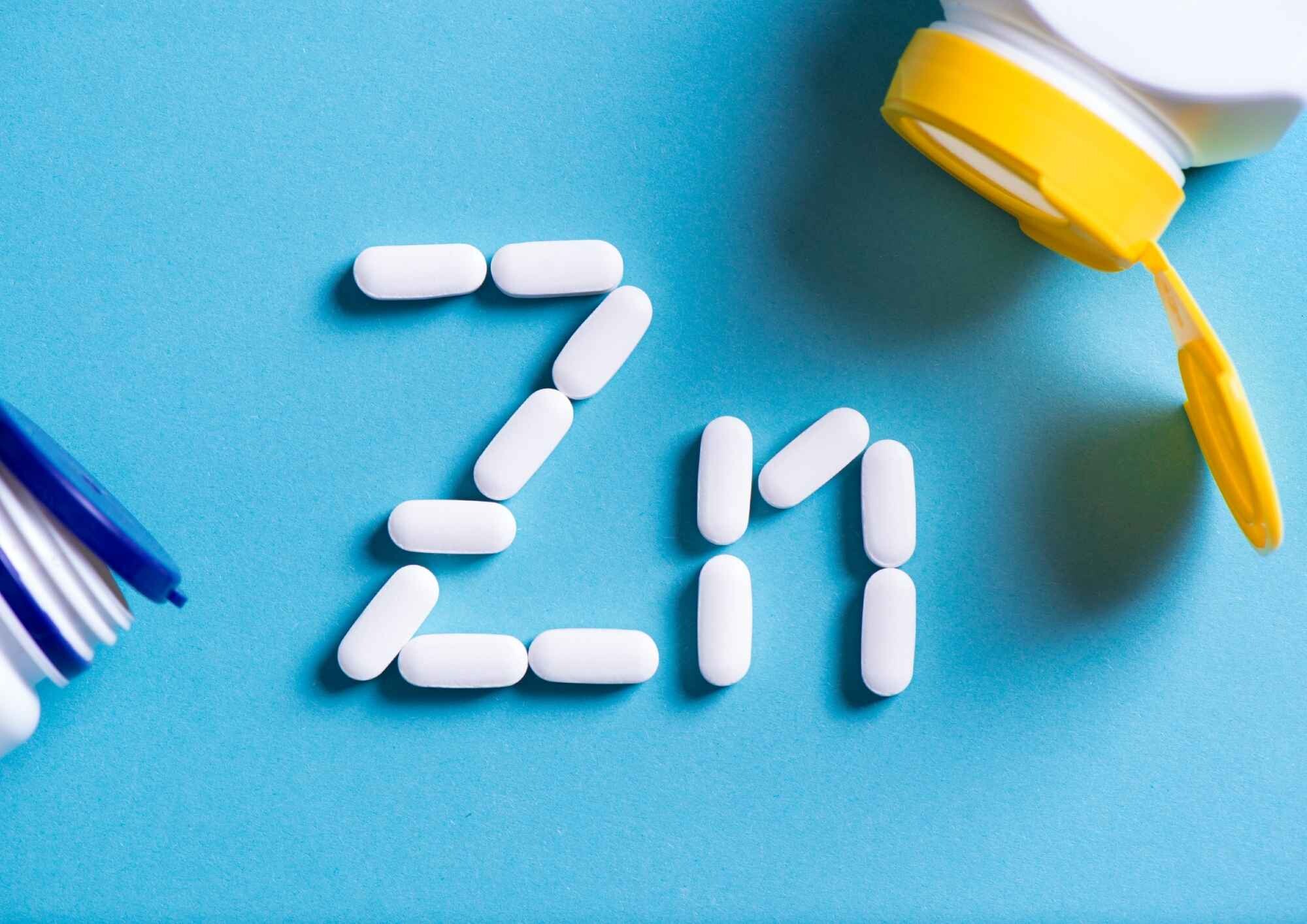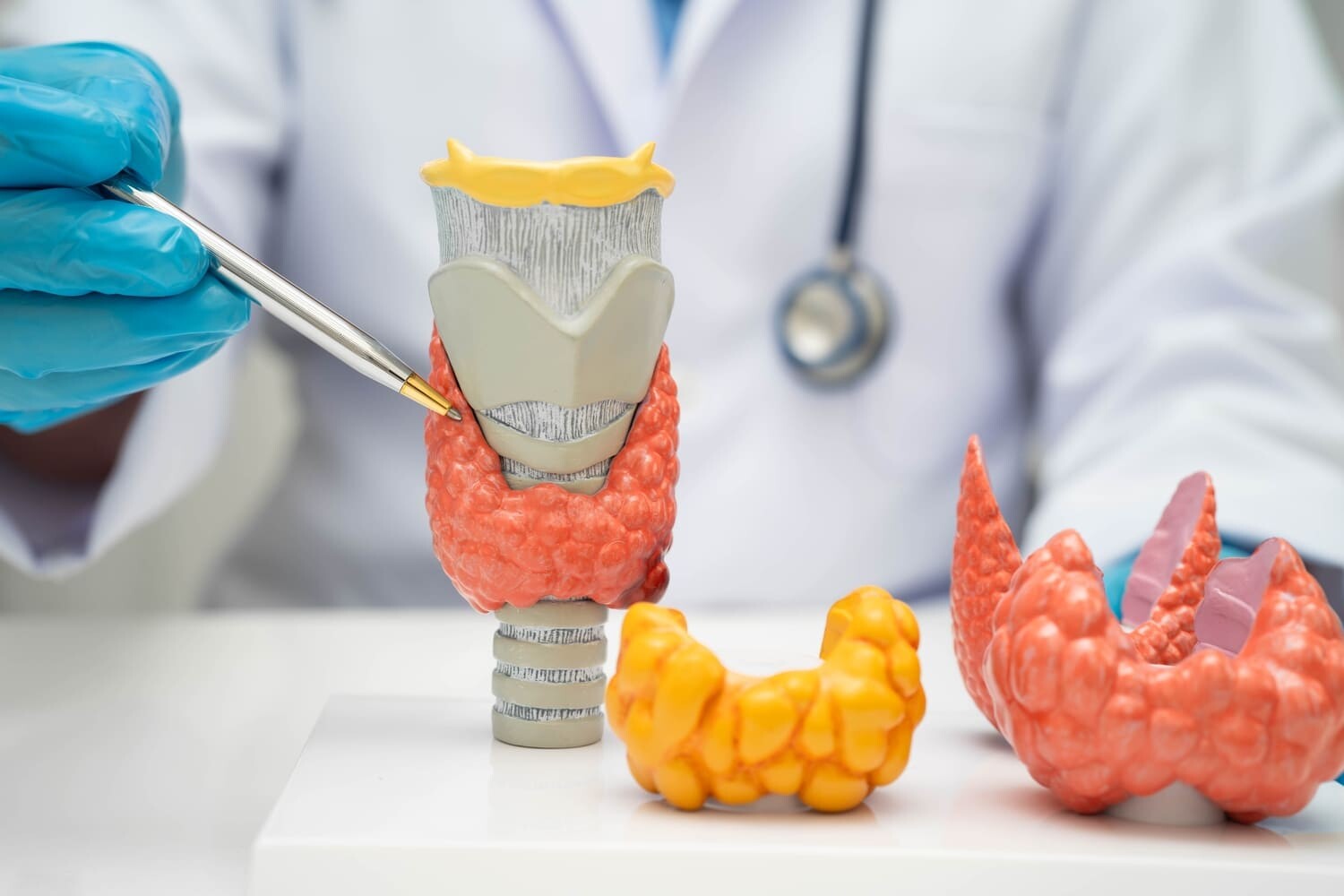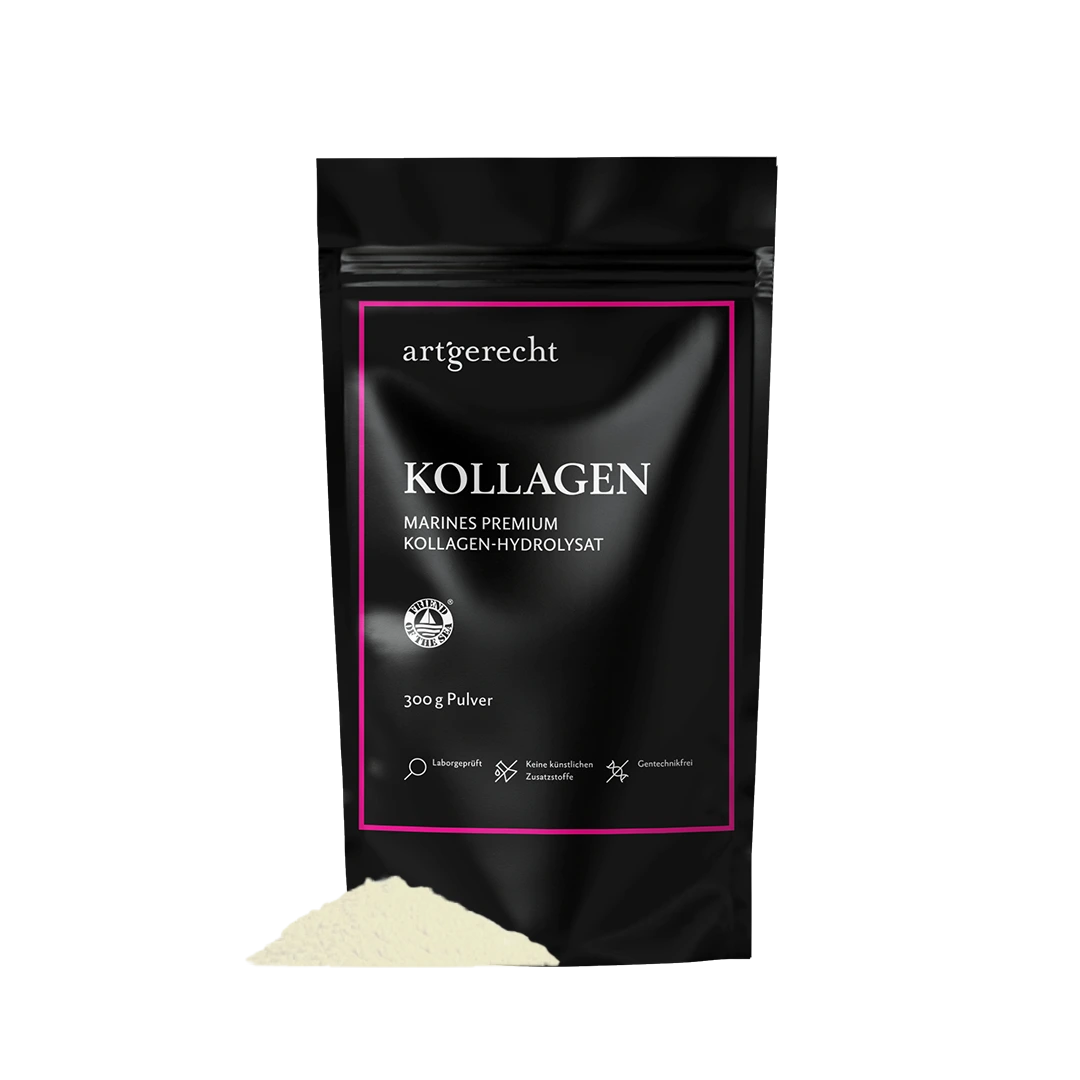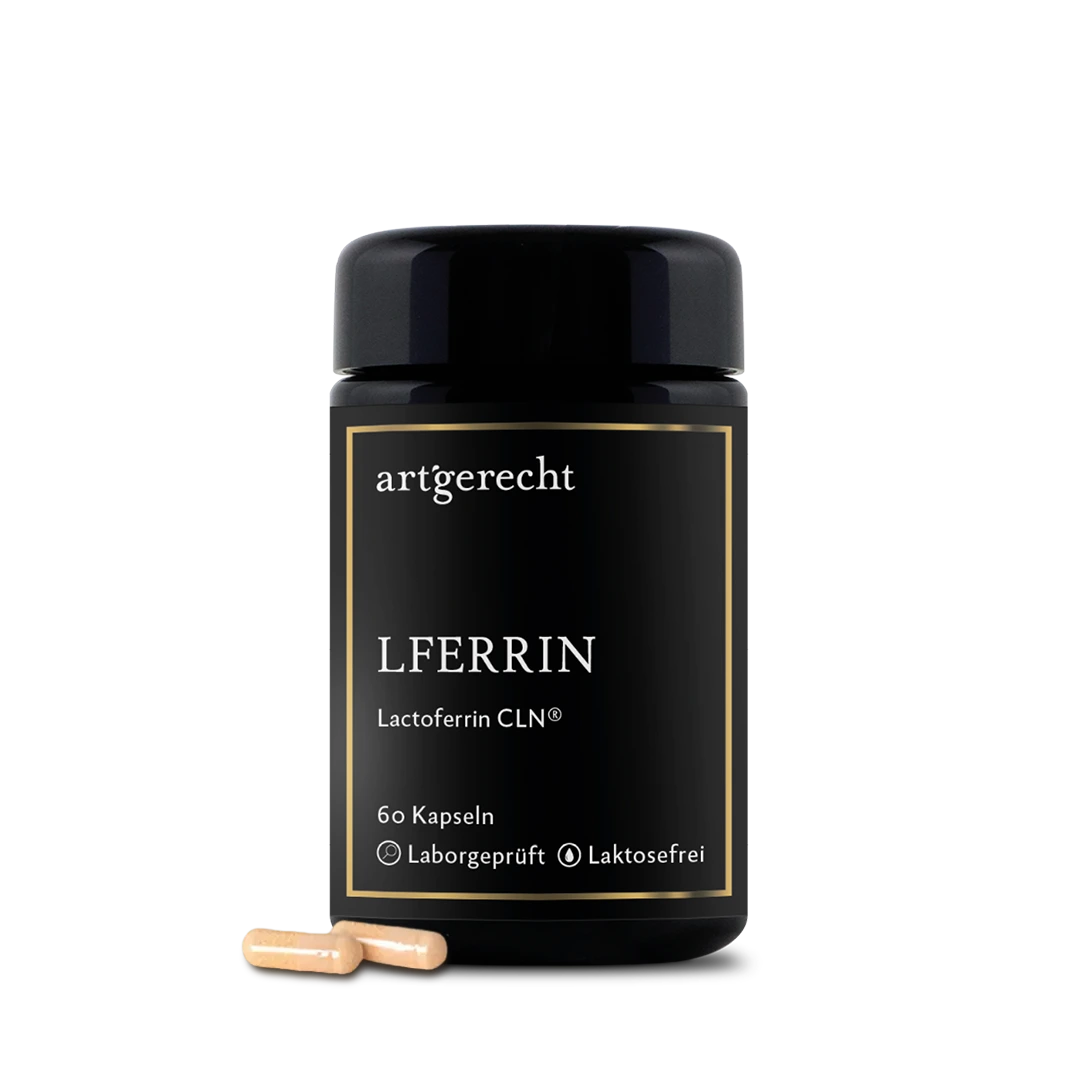The function of the thyroid gland
The thyroid gland is a central endocrine organ that produces and stores hormones that are essential for metabolism and body growth. It consists of two types of endocrine cells: Thyrocytes synthesize the thyroid hormones T3 (triiodothyronine, triple iodinated) and T4 (thyroxine, quadruple iodinated), which play a key role in numerous metabolic processes 1. Both hormones T3 and T4 are iodinated tyrosine derivatives. Tyrosine is an essential amino acid in the human organism 2. In addition, the thyroid gland contains C cells that produce the hormone calcitonin. This hormone plays an important role in regulating the calcium balance in the body.
The production of the thyroid hormones T3 and T4 requires iodide, stimulation by the hormone TSH (thyroid stimulating hormone) and the amino acid tyrosine in the form of tyrosine residues in the thyroid cells. If T4 is released in the body, the iodine can be split off as required and converted into the more active T3 ¹. The released hormones T3 and T4 primarily support the development and function of the brain, heart and kidneys. They promote growth, break down energy reserves and increase the basal metabolic rate. A lack of T3 and T4 can cause developmental disorders and reduced performance. A surplus of these hormones, on the other hand, leads to increased metabolic activity. The calcitonin produced by the C cells plays a role in calcium metabolism and in the mineralization of bones ².
Epidemiology of thyroid diseases
According to the WHO, around a third of the world's population lives in regions with iodine deficiency. In areas with severe iodine deficiency, goitre can occur in up to 80% of the population. People in remote, mountainous regions in Southeast Asia, Latin America and Central Africa are particularly affected. In a study by Reiners et al., 96 thousand working adults in Germany between the ages of 18 and 65 from an area with relative iodine deficiency were examined. It was found that 33% of the participants had thyroid nodules or an enlargement of the thyroid gland (goitre). The probability of thyroid changes increased with increasing age in the study. In iodine-deficient regions, the frequency of spontaneous hypothyroidism was around 1.2%. It occurs significantly more frequently in women, particularly in older people, and is around ten times more common than in men.
Consequences of disorders of thyroid hormones
In adults, a lack of T3 or T4 can reduce neuromuscular excitability and lead to listlessness and even depression. The reduced metabolic function can lead to an increase in fatty tissue, a lower basal metabolic rate and increased cholesterol levels. Iodine deficiency increases TSH production (thyroid-stimulating hormone or thyroid-stimulating hormone), which stimulates the growth of the thyroid gland and can lead to goitre. An excess of thyroid hormones, for example due to the body's own autoantibodies, can increase the heart rate and blood pressure. In addition, increased neuromuscular excitability can cause tremors and insomnia. The increased basal metabolic rate often leads to weight loss and increased sweating. In unborn children and adolescents, the lack of thyroid hormones can lead to an irreversible reduction in intelligence as well as a reduction in limb growth or hormone levels 2.
Nutrients to maintain thyroid function
Adequate iodine intake is important to maintain normal thyroid function. Iodine is an essential trace element that is indispensable for the body's own production of the thyroid hormones T3 and T4 and cannot be replaced by any other halogen ⁵. The European Food Safety Authority (EFSA) recommends an age-dependent iodine intake. For adults aged 18 and over, the recommended daily dose is 150 µg. According to the EFSA, pregnant and breastfeeding women should even consume 200 µg of iodine per day ⁶,⁷.
Selenium is an essential trace element that plays an important role in thyroid health. The human body contains around 14 mg of selenium. A lack of selenium is associated with various thyroid diseases, such as hypothyroidism. A meta-analysis by Huwiler et al. suggests that selenium supplementation may be potentially beneficial in autoimmune-related thyroid diseases. However, to avoid the risk of selenium toxicity, the daily intake should not exceed 80–400 µg 6,⁸.
Zinc is a trace element that plays a central role in gene expression and cell growth. It acts as a cofactor for many enzymes involved in various physiological processes, including the synthesis of thyroid hormones and various metabolic processes. Zinc deficiency can impair the function of thyroid hormone receptors, reducing their ability to bind thyroid hormones and regulate gene expression. This can lead to disturbances in the signaling pathways of thyroid hormones. Numerous studies and reviews show a link between zinc deficiency and hypothyroidism 6.
Vitamin A appears to play an important role in the regulation of thyroid function and to influence thyroid hormone homeostasis in several ways. Vitamin A deficiency, especially in combination with iodine deficiency, is associated with impaired thyroid function, but this has not been conclusively proven. Studies show that vitamin A influences gene expression in the TSH receptor signaling pathways and is therefore involved in the production and release of thyroid hormones 6.
Shield gland complex from species-appropriate
The thyroid gland complex from artgerecht offers a way to support the normal function of the thyroid gland and its hormones. The special combination of nutrients such as L-tyrosine, iodine, selenium, zinc and vitamin A provides the body with all the building blocks it needs to maintain hormone homeostasis. The Shield gland complex is suitable for people who want to support their thyroid function in a natural way. It can be particularly helpful for people who pay attention to a balanced nutrient supply or need support in the normal function of their thyroid gland.
¹ Pirahanchi, Y., Tariq, M. A., & Jialal, I. (2023). Physiology, thyroid. StatPearls.
² Schmidt, Lang, Heckmann. Human physiology with pathophysiology. 31st edition. Springer Medizin Verlag Heidelberg 2010
³ Vanderpump, M. P. (2011). The epidemiology of thyroid disease. British medical bulletin, 99(1).
⁴ Reiners C, Wegscheider K, Schicha H, et al. Prevalence of thyroid disorders in the working population of Germany: ultrasonography screening in 96,278 unselected employees. Thyroid. 2004;14(11):926-932. doi:10.1089/thy.2004.14.926
⁵ Gärtner, R. (2007). Important trace elements for the thyroid gland. Prevention and Health Promotion, 2(3), 185-190.
⁶ Shulhai, A. M., Rotondo, R., Petraroli, M., Patianna, V., Predieri, B., Iughetti, L., … & Street, M. E. (2024). The role of Nutrition on thyroid function. Nutrients, 16(15), 2496.
⁷ EFSA NDA Panel (EFSA Panel on Panel on Dietetic Products Nutrition and Allergies), 2014. Scientific Opinion on Dietary Reference Values for iodine. EFSA Journal 2014; 12(5):3660, 57 pp. doi:10.2903/j.efsa.2014.3660
⁸ Huwiler, V.V.; Maissen-Abgottspon, S.; Stanga, Z.; Mühlebach, S.; Trepp, R.; Bally, L.; Bano, A. Selenium Supplementation in Patients with Hashimoto Thyroiditis: A Systematic Review and Meta-Analysis of Randomized Clinical Trials. Thyroid 2024, 34, 295–313.

